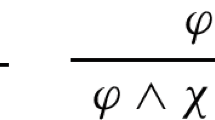Abstract
Mark Jago’s four arguments against Takashi Yagisawa’s extended modal realism are examined and shown to be ineffective. Yagisawa’s device of modal tense renders three of Jago’s arguments harmless, and the correct understanding of predications of modal properties of world stages blocks the fourth one.
Similar content being viewed by others
Notes
‘Modal space’ is Yagisawa’s phrase, which corresponds to Lewis’s ‘logical space’.
Here are two examples of the fourth modal tense: ‘every world is m accessible from some world’; ‘x and y are m worldmates at some world’. This modal tense will be used in the discussion of Jago’s fourth argument.
The point of this analogy is not that the impossibility tense is analogous to the past tense; the mere possibility tense is more analogous to the past tense. Rather, it is that the proper tensing protects the conclusion from being unacceptable.
It may further be said that such implicit modal tensing leads us to postulating possible worlds as truth relativizers.
The proposed defusing of Arguments I–III is in concert with Yagisawa’s defusing of Christopher Peacocke’s argument against the merely possible in Yagisawa 2010: 85-6.
The verb ‘are’ is modally tensed with m because worldmate-ship is the existence of a certain kind of world—a world at which both objects in question exist—in modal space at large.
This is so because s v and t v are stages at the same world v.
One could challenge the step from 9 to 10 by saying that ‘◇~Wb w b u ’ is true if at some possible world either b w or b u fails to have a counterpart. I am sympathetic to such a challenge. But here I am assuming a more charitable interpretation of Argument IV, according to which ‘◇~Wb w b u ’ means that it is possible that b w and b u exist and are not worldmates.
If S5 is not appropriate for reasoning about this kind of case, what logical system is? I leave this question to the reader to ponder. One radical alternative is simply to forbid predication of any modal property of any world stage.
References
Jago, M. (2013). Against Yagisawa’s modal realism. Analysis, 73, 10–17.
Yagisawa, T. (2010). Worlds and individuals, possible and otherwise. Oxford: Oxford University Press.
Author information
Authors and Affiliations
Corresponding author
Rights and permissions
About this article
Cite this article
Yagisawa, T. Impossibilia and Modally Tensed Predication. Acta Anal 30, 317–323 (2015). https://doi.org/10.1007/s12136-015-0254-z
Received:
Accepted:
Published:
Issue Date:
DOI: https://doi.org/10.1007/s12136-015-0254-z



